|
Many years ago, when we were settling our firstborn son in for bed, my husband would cradle him in his arms and swing him vigorously back and forth while singing “Go forth among the people, people of every nation. Tell them how Christ came to save. Tell them how he came to bring salvation.” I believe that took root in my son’s life and was nourished over the years to equip him to be a forthright disciple of Christ as an adult today. My husband and I were raised in the security of a culture of Christendom of the 1950’s and 60’s. What did this look like? Our culture, all aspects of society were steeped in Christian principles. Our laws and basic moral understanding were rooted in Judeo-Christian truth that made it relatively easy to adhere to a Christ centered life. “Go forth and tell! O Church of God, awake! God’s saving news to all the nations take. Proclaim Christ Jesus, Savior, Lord and King, that all the world His worthy praise may sing.” Over the last several decades we’ve witnessed our culture radically change. The world view of our dominant culture no longer ascribes to fundamental biblical principles, and we have shifted from the age of Christendom into an Apostolic age. Our basic mode of operation needs to change to continue to be effective bearers of Christ’s love to one another. Many Christians have become fearful and overwhelmed and even despaired because of this cultural shift. It is essential that we remain encouraged and adjust how we live so we can be bold missionaries for the kingdom of God in our world today. As far back as 1974, Bishop Fulton Sheen was a prophetic voice to help us recognize our call as Christians in a time of change. He said: “We are at the end of Christendom. Not of Christianity, not of the Church. The economic, political, and social life inspired by Christian principles has ended. But these are great and wonderful days in which to be alive. Therefore, live your lives in the full consciousness of this hour of testing and rally close to the heart of Christ.” “Go forth and tell! God offers life to all; The Lord makes rich all who on Him shall call. How shall they call if they have never heard the gracious invitation of his word?” I believe the activities and traditions my husband and I learned and practiced as we parented our six children have been instrumental in equipping them to be ambassadors of Christ in this new age of evangelization. I am forever grateful for my “upbringing,’ for the solid passing on of faith from my family, my parish, my schools, and my neighbors. The blessing of being nurtured in the age of Christendom caught me – body, mind, and spirit. Through pure grace, I continue to grow in who I am, what I am purposed to do and rely on my relationship with Jesus, the reception of the sacraments, and strive to live the Beatitudes as I journey into this current era. I am aware of the difficulties people are facing today remaining rooted in Jesus and how easy it is to fall prey to some current views that are contrary to Christianity. “Go forth and tell! Men still in darkness lie; in wealth or want, in sin they live and die. Give us, O Lord, concern of heart and mind – a love like Yours which cares for all mankind.” I recall Cardinal Wojtyla in 1976 speaking in Philadelphia to Americans, calling us forth out of our comfort into this age of evangelization to minister to the people around us in a radical new way. “We are now standing in the face of the greatest historical confrontation humanity has gone through. We are facing the final confrontation between the Church and the anti-Church, of the Gospel versus the anti-Gospel.” He was clearly prophesying to awaken us to adopt a new approach to live the Christian life and to reach the people lost and on the fringes. Later, as Pope John Paul II, he pastored us in how to counter the culture of death. God has been preparing us through prophetic voices throughout history to be aware of the days of tribulation and darkness so that the Holy Spirit can be with us to be vibrant witnesses in those times. Jeremiah reminds us in 15:21 “I will rescue you from the hands of the wicked and deliver you from the grasp of the ruthless.” Many of David’s psalms emphasize God’s constant care for us and that He will never abandon us. “Go forth and tell! Christ charges us to go. All power is His; from Him the blessings flow. Live out your life as Christ your Lord shall choose; Your ransomed powers for His sole glory use.” In this apostolic age we are called to be intentionally evangelistic in a manner far different than ever before. We have to look back to the life of the 12 Apostles and the culture they lived in for our example. They were not theologians, had very few followers, had no church buildings, no foreign mission’s expertise, next to no monetary resources, no written gospels to preach from, and society was hostile or apathetic towards them. Yet they were ecstatic to go out to all the nations and share the perfect love of Jesus to all. What was it that propelled them so enthusiastically? They had the Holy Spirit. This is the same Holy Spirit we have that empowers us today and fires us up with unrestrained joy to bring life giving support to those we encounter. Just as the Apostles and early Christians – we are commissioned by Jesus through His blood shed for us and are confirmed in the Spirit to operate in His gifts. We do not have the right or luxury to say these gifts are only for some and not for me. Each of us is accountable to the call. We cannot say “I can’t,” “I won’t,” or “It’s not my gift.” Jesus calls us forth to offer words of knowledge, laying on hands for healing, saying deliverance prayers, giving encouragement, discerning spirits and to love intensely. The book of Acts is our roadmap. “Go forth and tell! O Church of God, arise! Go in the strength which Christ your Lord supplies. Go ‘til all nations His great name adore, and serve Him Lord and King forevermore.” Song: Go Forth and Tell by James Seddon As we enter this Advent 2021 season, we are afforded a time to renew our identity in Christ, examine our mission call, and move forward as joyous disciples proclaiming the kingdom of God in everything we do. The simple truth is that God lives inside each of us. We are expected to be aware of His presence and to allow Him to do whatever He chooses through us. What a beautiful privilege! It is truly a blessed and anointed time to be alive! Let this be our great adventure together as committed Christians.
0 Comments
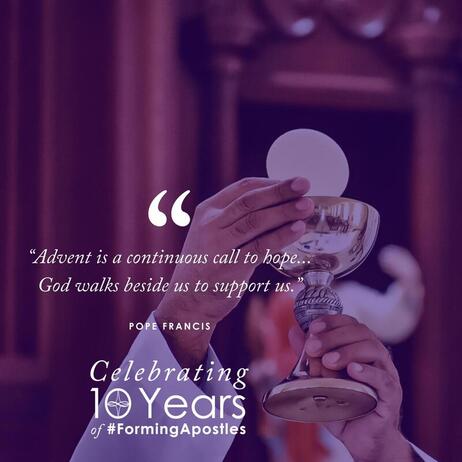 Advent offers a time of waiting and renewal rooted in Christ. We are waiting for the celebration of the Incarnation, the Word made flesh, which we celebrate at Christmas. We are also waiting for the second coming of Christ at the end of time. It is an expectant waiting which calls us to renewal in our hearts and minds. Yet, even in the waiting we are not alone. Christ is with us. Pope Francis offers us this consideration: “Advent is a continuous call to hope… God walks beside us to support us. The Lord does not abandon us; He accompanies us through the events of our lives to help us discover the meaning of the journey, the meaning of everyday life, to give us courage when we are under duress or suffering” (Angelus, November 29, 2020). Sometimes amid times of difficulty, we simply try to move forward, but may lack hope, and find it challenging to advance. Advent provides time to recognize more fully that we are accompanied by Christ and that our hope is found in him and him alone. There are many who offer messages of hope that is fleeting. The hope offered by Christ is eternal. It challenges us to greater renewal in him. As Pope Francis notes, it takes courage to journey forth, courage that comes from Jesus Christ. As we enter the Advent season, may this time of waiting truly be one of renewal, lived in hope that has a name, Jesus Christ. May the Charity of Christ urge us on! In God, the Infinite Love, Fr. Frank
Today we celebrate Blessed Miguel Agustín Pro, a Jesuit priest who ministered to the Church in Mexico in the 1920s during a time of violent government-led anti-Catholicism. At his beatification Mass on September 25, 1988, Pope Saint John Paul II described Blessed Miguel’s virtue and apostolic zeal:
“Neither suffering nor serious illness, nor the exhausting ministerial activity, frequently carried out in difficult and dangerous circumstances, could stifle the radiating and contagious joy which he brought to his life for Christ and which nothing could take away (cf Jn 16:22). Indeed, the deepest root of his dedication to others was his passionate love for Jesus Christ and his ardent desire to identify with Him, even in his death. He expressed this love especially in Eucharistic worship. The daily celebration of Holy Mass was the center of his life, as well as a source of strength and fervor for the faithful. Father Pro had organized the so-called ‘Eucharistic stations’ in particular homes, where the body of the Lord could be secretly received every day during the years of persecution.” Before the firing squad, Blessed Miguel Pro stretched out his arms in the form of a cross and used his last breath to declare, “¡Viva Cristo Rey!” meaning “Long live Christ the King!” It is fitting that having just celebrated the Solemnity of Our Lord Jesus Christ, King of the Universe, the feast of Blessed Miguel Pro offers us yet another opportunity to reflect on what it means to declare Christ as our king and to live our lives as Christ’s faithful subjects. To profess Christ’s sovereignty is to set aside every other loyalty and to surrender all that we have and all that we are to the Lord. It is to acknowledge that we are living for something greater than ourselves and greater than whatever allegiance we may have to any country, political party, sports team, or anything else. Allowing ourselves to be entrenched in such earthly things often keeps us from true communion with our brothers and sisters, especially the suffering and the marginalized. Yet, acknowledging Christ’s rightful authority over each and every one of us means living in radical unity and solidarity with one another, knowing that “There is neither Jew nor Greek, there is neither slave nor free person, there is not male and female; for you are all one in Christ Jesus” (Galatians 3:28). While the kings of this world seek out self-gain and self-preservation, often forcefully asserting their power, Christ’s kingship of self-sacrifice, self-gift, and rightful authority brings healing and unity to the divisions we have created for ourselves. If we wish to follow Jesus, whose kingdom “does not belong to this world” (John 18:36), we, like Blessed Miguel, must answer the call to take up our cross daily and lay down our lives for him. Though we may not suffer religious persecution like Blessed Miguel Pro, each of us can learn from his imitation of Christ, his life of generous service, and his love of the Eucharist. Blessed Miguel’s willingness to celebrate the Mass, even at great personal risk, invites us to a greater devotion to the Body of Christ, to detachment from every earthly entanglement, and to foster true communion by making a gift of our very selves in service of others. As we gather around the Eucharistic table, may we too be strengthened and committed all the more to building up the Kingdom of God in which justice and peace will prevail. May Blessed Miguel Agustín Pro—and indeed all the holy men and women who have given their lives for the sake of the kingdom—intercede for us that we may welcome Christ’s reign by glorifying the Lord by our lives. In 1745, Fr. Alban Butler produced his collection of the Lives of the Saints. It’s been in circulation ever since, providing the faithful with stories of holy men and women as exemplars to imitate. Oftentimes, the stories in the volumes of the Lives of the Saints do not seem to portray real human beings. The brief passages list only miracles and pious deeds. Sometimes I feel that the examples used could even make the sweet St. Therese, the Little Flower, look positively scandalous in comparison! This is not to say that Fr. Butler’s work is in vain. It is good that these names are recorded for us. As we celebrate All Saints’ Day, we should honor those who came before us and passed down the faith from generation to generation. But this feast day raises the question: what is a saint? The process of canonization tells us that we know when a certain person is surely in Heaven and that their life is worth imitating, but there are more unrecognized saints than those that are recognized. Saints are people who, through the course of their lives, have grown into the image of themselves which God holds in His divine mind. They become who they were created to be in the fullest sense. The marvelous thing about saints is that they were real, gloriously messy, complex human persons. If we believe every human being is an unrepeatable expression of God’s love, then it stands to reason that every saint is an unrepeatable example of what it means to live out of that love. I think too often we get concerned with trying to imitate certain saints, like St. Therese, and forget to discover who we were created to be. You cannot be St. Therese: Part 2, or Bl. Pier Giorgio Frassati 2.0. Those roles have been taken because those two individuals had the humility to see the greatness God was inviting them into. They stepped into the journey of becoming who they were meant to be. Dr. Gianna Molla, known for giving her life to save her infant daughter’s, was not a saint because of that one action. Her life was steeped in holiness. She was a doctor, a mother, a lover of fashion, and apparently a terrible driver. But as much as I want to be her when I grow up, I can’t. I will never be a doctor, for one thing. What I can do is find pieces of my personality in hers, and I can learn from her example of how she lived and how she handled certain situations and use those lessons in my own life—much like getting advice from an older sister. Holy lives are not replicas of each other. You cannot program holiness by inserting a set of statutes, commands, circumstances, or ideals into people. Pope Emeritus Benedict XVI, in his General Audience on April 13, 2011, said “Holiness, the fullness of Christian life, does not consist in carrying out extraordinary enterprises but in being united with Christ, in living his mysteries, in making our own his example, his thoughts, his behavior” (emphasis mine). We are called to live as Christ in a particular manner, in this particular time, with our own particular gifts. I cannot be you and you cannot be me. But I need you to be the person God has called you to be because we are part of the same mystical Body of Christ, alongside the saints. Conversely, I need to become the person God created me to be as well. We will never know all of our spiritual brothers and sisters until we reach Heaven. As members of the Church triumphant, the saints want us united with God even more than we want to be with Him because they love more perfectly than we do. May we imitate their holy example and ask for their guidance in living out of the love of God more and more completely each day. Reflection Questions: Who is your favorite obscure saint? What quality of sanctity do you want to grow in this season? For more resources on the saints, visit our Catholic Feast Days Website. **This post was originally published on 11/1/2018. As we celebrate the third World Day of the Poor, prophetically established by Pope Francis, I have just returned from a very unique visitation to Columbia and Venezuela. Let me limit myself here to Venezuela, because of some very touching experiences in this country. Venezuela, as we all know, is one of the resourcefully rich countries of the world, blessed with Petroleum, gold, and many other precious minerals. In the 1960's, this was one of South America’s wealthiest countries, enjoying the highest standard of living; yet today, how different the situation. 1 US dollar is equal to about 30,000 Venezuelan Bolivar. The monthly earnings of a worker is around $5; a medical doctor told me he gets $20 per month, if he even comes to be paid. Just imagine, then, the situation of ordinary people. Millions are migrating to all parts of the world. If possible, the able bodied men and women escape the country, leaving behind their parents and grandparents. People die not because they cannot be healed, but for lack of ordinary medicines; medicines which are either unavailable, or people are too poor to purchase them. One woman I met was suffering from skin cancer and heart problems; she can do nothing. This is a true story. Just imagine her plight. For lack of money or limited transports, children and teachers are unable to go to school. While there are many more examples to narrate, my intention is not to show this wonderful country in a bad way. Paradoxically, despite all of these hardships, I found the people very affectionate and joyful. I met with so many pastoral groups working in the parishes, and hardly anyone spoke about their hardships, or asked for any sort of help. The people were so nice, and I was really touched by them. Through Caritas Poland and local aid, our parishes are organizing soup kitchens and many other charitable activities together with the parishioners. As a small contribution from We Are A Mission, I myself went around distributing food items in one of our parishes. It was a very touching experience. Pope Francis speaks much about the poor, migrants, and the culture of indifference. At times, people get annoyed; why does the Pope keep harping over the poor? The question is precisely what he posed to us in his homily: “do I have at least one poor person as a friend in my life?” Have we come face to face with this poverty in our lives as Christians, or are we merely experts on speaking about it; limiting ourselves to words, and not truly encountering this existentially dark reality? Again as the Holy Father has written, “let us set statistics aside: the poor are not statistics to cite. The poor are persons to be encountered; they are lonely, young and old, to be invited to our homes to share a meal; men, women, and children who look for a friendly word.” Those who lived through the Second World War in Europe will know what it means to survive during and after, yet their grandchildren may not even like to read about those days anymore. It is one thing to speak about poverty, but it is something altogether greater if one has had a real taste of it. When Venezuela- a country greatly blessed by God with all the necessary riches for a decent living- is reduced to such a level of inhumanity by fellow human beings, can we remain indifferent as though it is only their problem? It’s as good as saying that the Amazonian issue is something of only a few countries of that area. But devoid of Amazon, the rest of us would be gasping for oxygen! When a family with a couple of small children wake up in the morning with neither food nor money to purchase it, how will the parents control the weeping kids? When some worry over their health due to overeating, having to count calories after all of the food they consume and walk for hours after they have eaten, it looks so absurd and paradoxical that millions elsewhere starve to death. This is the naked truth that makes us feel uncomfortable. Many will wash their hands and say that it’s all because of corruption or political anarchy in these countries. That is all true. The sanctions that many countries impose to correct these unjust structures and systems will end up hitting the poorest of the poor, and not those at the top, is another truth. I am not writing these lines with the hope of solving all the world’s problems. Instead, it’s to show that the poor are the blessed. The poor find their ultimate trust in Yahweh when all other sources of security are vanish. These are the people blessed with a genuine sense of humanity and compassion, as true evangelical joy is found in poverty and simplicity of life. The Lord of the Universe, Master of our History and Destiny, will make the necessary corrections and justice at the end. Until then- like Sunday’s Gospel- patience and perseverance in our trust in HIM, and the goodness in each person, must prevail. The best comes out of us when we are cornered to such a level. The more efforts there are efforts to destroy our humanity and dignity as persons, the greater will be in the interior force to manifest the beauty of freedom and preciousness imprinted upon us as an image and likeness of God. As we celebrate World Day of the Poor, let us unite ourselves with our Holy Father; kindling a candle of hope for the suffering parts of the world, be it through a smile, prayer, or even a dollar. Who knows, tomorrow we might need them, as this is so much part of our human condition. It is no wonder, then, that the Son of God Himself chose to be born poor to make us rich in divine blessings. “The poor save us, because they enable us to encounter the face of Jesus Christ.” **This post was originally published on 11/19/2019. I had joined the Catholic Apostolate Center in October 2014, just prior to its third anniversary of founding. I was asked to help move forward several projects and programs for the Center as a full-time staff member. I joined with little experience in Catholic non-profits. However, our Founding Director, Fr. Frank Donio, S.A.C., saw some potential in my work and was willing to put in the time and effort to help accompany me in the particulars of this world. Now, seven years later, I have completed a Master's Degree related to Church Management. I can look back on our 10th anniversary and see the work and contributions to the field of evangelization and missionary discipleship laid out before I joined the team. I say all this not as congratulations to us as an organization, but because the 10th anniversary has served as an excellent opportunity to reflect on the lessons I have learned and hope can be applied to your situation. One of the most critical pieces of knowledge that I have learned through my work is that collaboration and co-responsibility can have a profound impact on accompaniment and evangelization when done correctly. It is not easy to do, as most people reading this would agree, but it can have profound positives if done conscientiously and prayerfully. How to do that? It can take many forms, but one of the most important ways is allowing for specific and intentional prayer. Not just a simple Hail Mary or Glory Be to start a meeting, but an intentional time-consuming prayer to frame conversations and discussions to be spirit-led and discerning. Dr. Susan Timoney, in her recent book on Parish Pastoral Councils, has lots of good points on how to do this for that audience. However, these practices can apply to all meetings when we are gathered to discuss how God is calling us to serve our communities. Another piece of knowledge that I have learned through my work is the importance for all of us active Catholics to acknowledge the intrinsic value in people's contributions to the work of evangelization. What does this mean? It means that everyone, no matter their position, education, or formation, has value to the work of leading others to Christ. The Bible is full of examples of this, and the saints provide a similar model for us to follow. However, it can be challenging if you are a leader looking for people to take on the roles of a catechist or Eucharistic minister. What Living as Missionary Disciples: A Resource for Evangelization says about forming leaders is correct. They must be engaged in and adept in pastoral, intellectual, spiritual, and human formation. It is our responsibility as Catholics to encourage that growth in those we lead or assist. This also goes, to some extent, to the importance of accompaniment in our work as well. If we are not engaged in accompaniment, we are essentially letting people fend for themselves and not modeling what Christ did with the apostles and disciples as espoused in the Bible. I hope that with this blog post, those who are leaders in their parishes, bible study groups, and any other activity that promotes the work of evangelization, can understand that there are effective strategies for effective leadership. Through this, we can help others gather and learn of the mysteries of Christ and His Church. Suppose we all can accompany, lead, and offer discernment in prayerful consideration. In that case, we might help the wider community be engaged in the life, death, and mystery of Christ through the Church. When you ask someone which of Pope Francis’ writings they think of first, you’re likely to hear Evangelii Gaudium, maybe Christus Vivit if you’re talking to someone in youth or young adult ministry, Laudato Si if the person is particularly environmentally conscious, or Amoris Laetitia for those who work in family ministry. The two that, by my estimation, might be least likely to be mentioned are Lumen Fidei (which was Pope Francis’ first papal document and was written by both he and Pope Emeritus Benedict XVI) and his Apostolic Exhortation Gaudete et Exsultate. This is a real tragedy because Gaudete et Exsultate might be one of the most important writings in Pope Francis’ pontificate, though I know that since I’ve said this, he’ll write something even better. Recently, the Church has celebrated the Solemnity of All Saints and the Commemoration of All Souls. On All Souls Day, the Church prays for all of the faithful departed, for the souls in Purgatory who will, one day, be welcomed into the Eternal Banquet. The Solemnity of All Saints celebrates all of the Saints in Heaven, both those great saints who are venerated in churches across the world, and those “saints next door”. In Gaudete et Exsultate, Pope Francis writes, “very often it is a holiness found in our next-door neighbours, those who, living in our midst, reflect God’s presence… Let us be spurred on by the signs of holiness that the Lord shows us through the humblest members of that people which ‘shares also in Christ’s prophetic office, spreading abroad a living witness to him, especially by means of a life of faith and charity’.” He reminds us that holiness is not just for those who are called to do great things, but by all of those who live a life of faith and who are followers of Jesus. We often see prominent Catholics telling us to “do great things”. They get this from Pope St. John Paul II who said to young people at World Youth Day in 2000, “It is Jesus who stirs in you the desire to do something great with your lives, the will to follow an ideal, the refusal to allow yourselves to be grounded down by mediocrity, the courage to commit yourselves humbly and patiently to improving yourselves and society, making the world more human and more fraternal.” And the great Saint has a point: when the world leads us to such mediocrity, a mediocrity which leads us to individualism, relativism, and complacency, the Lord Jesus leads us to greatness. What I think can be lost in translation, at times, is that this greatness is not worldly greatness. This greatness which Pope St. John Paul II spoke of is the greatness that a life of faithful missionary discipleship can bring. Greatness that is marked by hope, by a rich and abounding charity towards our neighbor, by a gentleness that comes from resting in eternal truth, and by a trajectory that always moves, as Bl. Pier Giorgio Frassati would say, “verso l’alto”, or “to the heights.” In Gaudete et Exsultate, Pope Francis leads the People of God on this journey to greatness which, when properly viewed, is indeed the journey to holiness. He reminds us that the Scriptures give us regular calls to holiness, a theology which was explored and articulated more deeply and precisely at the Second Vatican Council. He reminds us that, “This holiness to which the Lord calls you will grow through small gestures,” in a way echoing the words of St. Teresa of Calcutta who said, “not all of us can do great things, but we can do small things with great love.” Maybe this is the greatness which Pope St. John Paul II was speaking about to those young people over two decades ago. Not greatness which is pursued for any individual person’s gain, but great love. Love which seeks to echo the love of Jesus Christ on the Cross, love that wills the good of the other. This love is articulated in the Beatitudes, which Pope Francis calls “the Christian’s identity card.” Pope Francis gives us a deep and insightful document in Gaudete et Exsultate. He gives us cause to reflect on our lives and on the holiness which the Lord calls us to. He reminds us that we can’t do the Christian life alone and that our living of that life will make us counter cultural. We should find great cause for hope in Gaudete et Exsultate. In the words of Pope Francis, may we, “ask the Holy Spirit to pour out upon us a fervent longing to be saints for God’s greater glory, and let us encourage one another in this effort. In this way, we will share a happiness that the world will not be able to take from us.” For more resources on Pope Francis, click here for our Pope Francis Portal. For more resources on Gaudete et Exsultate, click here for our resource page.
This November, many of the saints we celebrate have left a lasting impact in the Church. Three of the saints this month were known as “the Great”, all for unique reasons. We also will get to celebrate four lay women saints whose lives can still inspire us today. In addition, two days before Thanksgiving this year, on November 23rd, we will celebrate three feasts of men who all lived very different lives, but all devoted their faith to the faith. “The Greats” The first feast of “the Greats” in November is St. Leo the Great on November 10th. St. Leo the Great was a pope in the 5th century who is known as “the great” for saving Rome from invasion and thus saving the Church community in Rome. He is also known for his writings, which led to him being named a Doctor of the Church. On November 15th, we will celebrate the feast of St. Albert the Great: a 13th century Dominican known for both writing on the works of Aristotle and being the teacher to St. Thomas Aquinas. He is known as “the great” today for many of his intellectual contributions to the Church, which has also led to him being known as the patron saint of scientists and philosophers. The day after St. Albert the Great, we celebrate St. Gertrude the Great. She was as a mystic and was given the title of “the great” because of her deep theological and spiritual insights. While all these “greats” lived quite different lives, they became recognized as greats for their deep commitment to their faith throughout all aspects of their life. Lay Women On November 16th, we will celebrate St. Margaret of Scotland. When she was Queen of Scotland in the 11th century, she was known for her piety and using her position as queen for charitable works for all of the people of Scotland. She’s a great example to us of staying focused on our faith and charitable actions even through stressful times. I find it fitting that we will celebrate St. Elizabeth of Hungary the day after St. Margaret of Scotland. Even though St. Elizabeth of Hungary, a princess in the 13th century, only lived until 24, she used her wealth to establish a hospital and care for sick patients. Even though she didn’t live a long time, she is known as the patron saint of hospitals and nurses today. On November 22nd, we will celebrate St. Cecilia. St. Cecilia was martyred in the early Church and because of her musical passion, she is known as the patron saint of musicians today. Then, on November 25th we will celebrate St. Catherine of Alexandria, a saint from the early Church who converted to Christianity and then used the rest of her life to challenge pagan philosophers and engage with the intellectual components of the faith. All four of these lay women have greatly impacted the Church and continue to inspire us today. November 23rd On November 23rd, we will celebrate three feasts, a rare day where we have three separate feasts to celebrate. The first one chronologically is Pope St. Clement I, a pope at the end of the first century. Even after being exiled, he continued to work miracles, to the point where it cost him his life through martyrdom. St. Columban was a missionary is the 6th and 7th centuries who is known as one of the proto-missionaries in Europe. St. Columban is primarily known for his missionary work in Ireland where he helped establish the monastic tradition. Bl. Miguel Agustin Pro was a Jesuit priest in Mexico in the 1800s when public worship was illegal. Despite the fact the public worship was illegal, he continued to lead his people in the sacraments. He was eventually martyred; he is known for stretching out his arms as he was being killed and saying, “Viva Cristo Rey!” As we continue this November, let us pray for the intercession of these powerhouse saints, praying for their intercession to boldly life out our faith throughout our lives. To learn more about the saints, visit our Catholic Feast Days Website by clicking here. To view a calendar of the feast days in November, and each month, click here.
“Death is swallowed up in victory. Where, O death, is your victory? Where, O death, is your sting?” (1 Cor 15:54-55) In St. Paul’s first letter to the Corinthians, he makes a bold claim: death does not defeat us, death is not the end. Christ’s death has brought resurrection; through God’s grace, eternal life is ours. Death, a consequence of sin, has been conquered by Christ’s sacrifice and triumph. St. Paul encourages the Corinthians to keep death in its rightful place. That is to say, we are not to take death lightly. Mindfulness of our mortality should motivate us to avoid sin and prepare for our final judgement. But we also should not give death power over us to keep us living in fear. This acknowledgement of death’s rightful place is illustrated beautifully by the celebration of Día de Muertos in the Latino tradition. While this celebration pre-dates the arrival of Christianity to the Americas, the cultural intuition points toward the Gospel truth that the meaning of death, “is revealed in the light of the Paschal mystery of the death and resurrection of Christ in whom resides our only hope” (Catechism of the Catholic Church, 1681). The people of Mexico and Latin America celebrate this feast, not out of a macabre fascination with death, but out of a whole-hearted belief that our earthly life is not all there is. Día de Muertos is celebrated primarily on the 2nd of November, the Commemoration of All the Faithful Departed (or All Souls’ Day), but also throughout the entire month. Altars, or ofrendas, are assembled and decorated with sugar skulls bearing names of the deceased, and pictures of loved ones are displayed. The favorite food and drink of the beloved dead are placed prominently on the altar. Families and friends celebrate at cemeteries by eating tamales and pan de muerto (a sweet bread topped with pieces of dough made to look like bones), drinking atole (a hot drink that is thickened with masa and sweetened), and singing along to the music of mariachi. Elaborately cut tissue paper (called papel picado) and brightly colored marigolds (or zempasuchil) line streets, altars, and gravesites. Candles are burned as the vigil is kept. Limericks, poems, cartoons, and jokes make fun of death. All of this is done to put death in its place, to recognize it for what it truly is, and remind us that death does not have the last word. While we may still mourn, we place our hope in the Resurrection and look forward to reuniting with our loved ones in eternity. Entrusting them to the mercy of God, we pray that “as our faith in your Son, raised from the dead, is deepened, so may our hope of resurrection for your departed servants also find new strength” (Roman Missal, Collect for the Commemoration of All the Faithful Departed). From the very earliest days of Christianity, we have honored the memory of the dead with the greatest respect and offered prayers for them. The first martyrs’ places of death, burial sites, bodies, and even possessions (relics) were venerated. Churches were built in their honor, and the accounts of their lives, suffering, and death were proclaimed in celebrations. Similarly, families gather on Día de Muertos and share about their beloved dead, passing on treasured memories to the next generation. They honor their loved ones, celebrate their lives, and pray for the souls of the faithful departed—a spiritual work of mercy. This commemoration may not take away our pain or grief, but it does invite us to place our hope in the Resurrection and affirm that death has lost its power. “For even dead, we are not at all separated from one another, because we all run the same course and we will find one another again in the same place. We shall never be separated, for we live for Christ, and now we are united with Christ as we go toward him . . . we shall all be together in Christ.” (St. Simeon of Thessalonica, De ordine sepulturæ, as quoted in Catechism of the Catholic Church, 1690). Let us then celebrate today’s feast praising the Lord who “is not God of the dead but of the living” (Mk 12:27). |
Details
Archives
July 2024
Categories
All
|
About |
Media |
© COPYRIGHT 2024 | ALL RIGHTS RESERVED



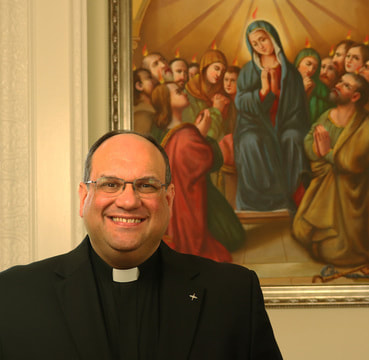
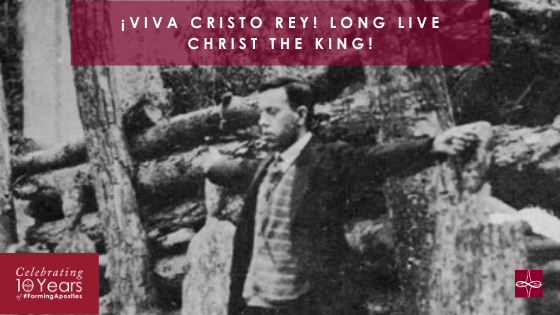



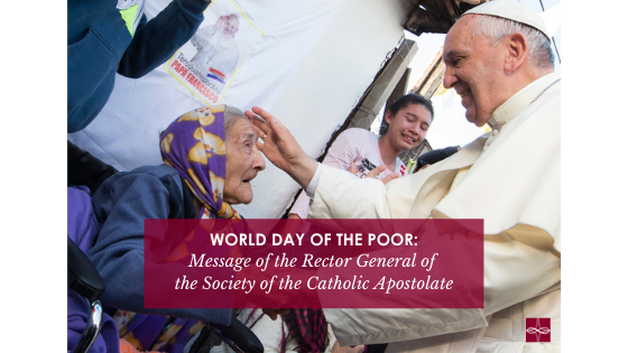
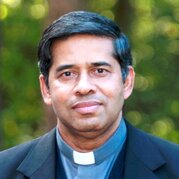
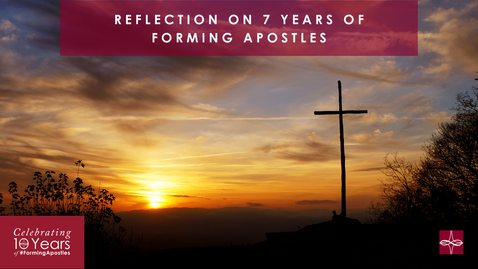
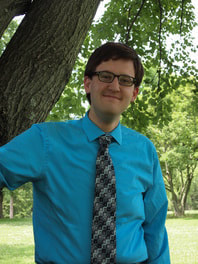
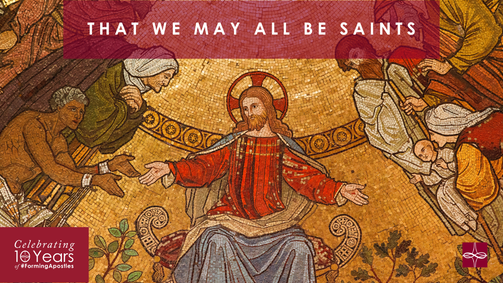
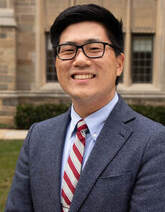
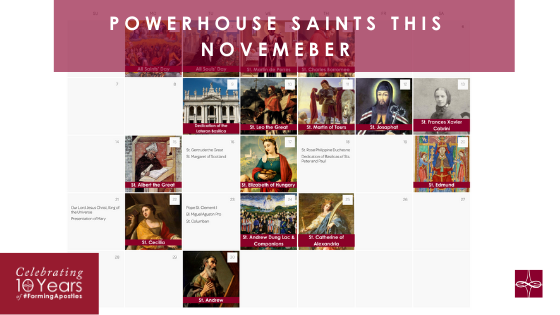
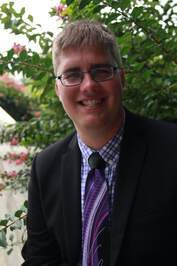
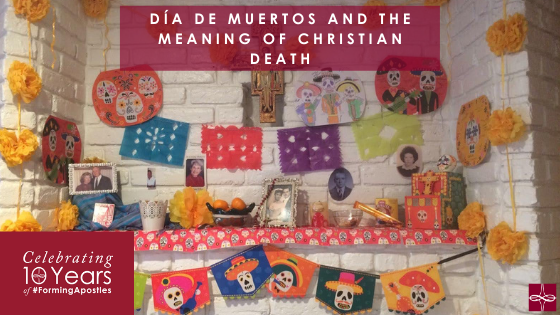

 RSS Feed
RSS Feed